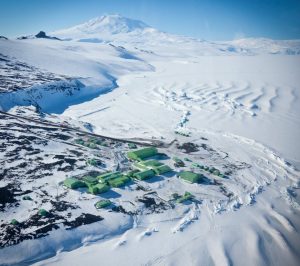
“The simple things in life that we take for granted. Family and friends back home, fresh fruit and vegetables, trees, grass, running water, rain and a comfortable bed.”
These are the things that Anthony Powell misses when he returns time and again to work in the Antarctica.
At 52 years old he has just completed his 8th summer and 10th winter down there and is now faced with entering back into society.
“Once you spend a decent amount of time there, you can have trouble re-adjusting when you return to normal life. Being bombarded by noise and advertising, being stuck in traffic, seeing crowds of faces you do not recognise, breathing in city smog or even having too many choices at the supermarket.”
Arriving for the first time in 1998 he was surprised just how big it was.
“Stepping off the plane for the first time is a bit like walking up the edge of the Grand Canyon for the first time. It is hard to convey the sense of scale. Even after spending a big part of my time there travelling all around in helicopters to work on field communications, I know I have still only seen a tiny fraction of it all.”
Anthony fell into routine as a Satellite Engineer before becoming a full time photographer and filmmaker. One of the hardest things he found to deal with was the isolation from friends and family and missing out on family events.
“If something goes wrong at home during the winter, you have no way of being with your family, you are stuck here. During the winter we are isolated from the rest of the world for six months with no way out.
“In many ways one of the best things about being here is the isolation. You are suddenly free from media bombardment and advertising. You have all the noise of modern society removed and you get to concentrate on the simple pleasures of life again.
“Also nutritionally it can be difficult. There are no fresh fruit or vegetables for nearly six months in winter. A small greenhouse can provide a very small green salad once a week if it is running but even that is not guaranteed. Some bases have hydroponic green houses. They are very expensive to run with all the lights though as for most the power comes from diesel generators.
“You are also forced to be a lot more creative to get things done because you have to work with what you have on hand. You can’t pop out to the local hardware store to pick something up so being inventive and capable of lateral thinking is a great asset.”
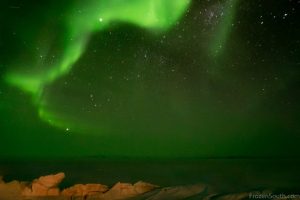
Due to the dark winter months the staff wintering over in Antarctica get affected by a syndrome known as T3.
‘It is a generic term we use to describe the symptoms almost all of us begin to feel later in the winter. Common symptoms are short term memory loss, low energy levels, loss of vocabulary, zoning out and starting off into space, forgetting names of people or everyday objects like say the salt on the dinner table.
“It is thought to be caused by a number of things like the fatigue from the long work hours with only one day off a week for months on end. The lack of sunlight, meaning we are all vitamin D deficient. The thyroid T3 hormone being draw away from the brain to the muscle because of the extreme cold. The lack of new stimulus and just being stuck in a routine. Being surrounded by the same people and doing the same work all day, day after day.
“One time I went to unlock the door to my office. I only have three keys on my key ring, all very different and I use the same key every day. Suddenly I could not remember which key to use and had to try them all one at a time.
“You find you have to write everything down in a diary or you will not remember the things you were going to do or meetings you had to go to.”
Even after all these years Anthony loves the Antarctica calling it ‘truly the last pristine wilderness left on the planet’.
“There are places where no human has ever set foot. The air is incredibly crisp and clean. The skies are clear and free of light pollution letting you see more stars than you can imagine. I you get away from the base on a calm day there is absolutely nothing to hear but your own breathing. The auroras and nacreous clouds can fill the entire sky sometimes. It is just breath taking!
“We try to make as little impact as possible on the environment and keep things as natural as possible. We are not allowed to interfere with the wildlife. We do not approach them closer than 10 metres / 30 feet as a general rule. Often penguins will approach us because they are curious. We will just sit still until they move on.”
Living on Antarctica is often referred to like living on another planet by the residents.
“A lot of us refer to the rest of the world as being ‘Back in the real world’. Everyone has to pass a very strict medical examination before they come down. Six months of darkness brings people close together and you feel more connected but it also makes any small annoying things bigger. Emotions generally get amplified – both good and bad. You have to be understanding and patient.”
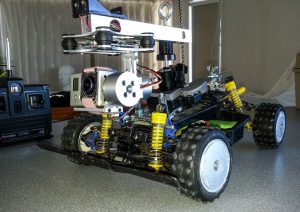
The simple pleasures for Anthony have been photography. He has fine-tuned his ‘Mcguyver’ skills in creating new camera equipment that is capable of functioning in the extreme cold of the Antarctic winter.
“It is normal work but in an extraordinary environment. You have to be very self-sufficient and inventive because most of the time it is just you and what you have with you. You can’t go out to get spare parts from the local hardware store. You have to make do with what you have.
“Some of the most ground breaking science in the world is taking place in Antarctica. Often scientists will prepare for years for only a few weeks of research on the continent during the summer season. You have to be willing to go the extra mile and put in a lot of long days. If they have equipment failure or something else goes wrong it can mean the loss of a huge amount of work. Being willing to help them in any way you can makes all the difference.”
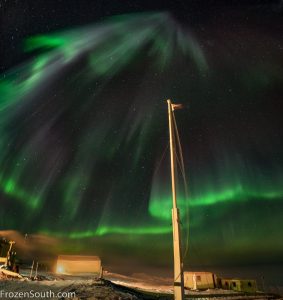
The vastness of the landscape and the amazing light shows in the sky captured Anthony’s heart and he decided that this was something everyone needed to see for themselves.
“Auroras are something I never get tired of, they can range from the very subtle discolouration of the sky, through to full on lighting up the entire landscape. It can look like the sky is opening up in a massive vortex of colour, about to swallow you up, inducing a strong sense of vertigo and awe.
Initially he started shooting time-lapse when digital cameras got to the point where you could take a still photo that would hold up on a big screen and was amazed at how well it brought the landscape to life.
“The first few years were just building up more and more footage as well as inventing systems that could still work in the extreme cold of winter.
“Often what is on the screen for a few seconds took me days or sometimes even months to capture. Once I felt I had enough material to show the changing seasons of nature I then concentrated on filming the people more and telling the story to hold the rest of the visuals together.
“Because I was only filming the documentary in my spare time it took a long time to produce. By the time you get your normal full day’s work done there is not a huge amount of time left over. The work week is 10 hours a day, 6 days a week, with one day off to rest and recuperate.”

Anthony has filmed his documentary Antarctica : A year on ice from an insider’s point of view gathering footage over 10 years including nine winters.
“It is told from the perspective of the everyday workers, the mechanics, technicians, cargo handlers, carpenters, electricians, cleaners and cooks, all the people who keep the bases running. As it has been made by an insider, it also means unparalleled levels of access to places and people.
“Most visiting film crews only come down for a few weeks during the short summer season which is only a tiny fraction of the full experience. Imagine if a film crew could only film your home town for the summer holidays. They would only be getting a very limited view of what it is like to live there. For the first time audiences get to experience the full year-round life in Antarctica.”
Anthony’s love for the Antarctica took another turn when he met a lovely American lady.
“We first met at the ‘Tatty Flag,’ the tiny bar at Scott Base. We took a swing dancing class and got to know each other better. We became friends, did some traveling together, and then we became more than friends,” Christine says.
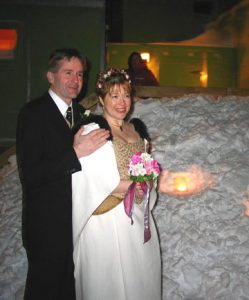
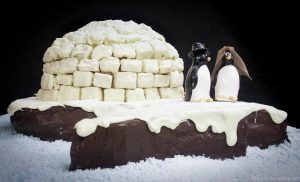 They are one of a few couples to meet and marry on the Ice.
They are one of a few couples to meet and marry on the Ice.
“The wedding was very spontaneous. After Anthony proposed, the community decided they should plan our wedding. Everyone got involved. It was amazing.
“It was a very unique wedding and was a fantastic experience. I can’t imagine a better way to get married. It made sense that it was the one place that we both loved and meant the most to us.”
Anthony adds. “We had 2-way communication with our parents in New Zealand, California and Arizona. They spoke to us and could hear everything that was going on. It was pretty special.”
“Meeting Anthony the ‘Love of my Life’ in such a remote place was amazing. I like to say I had to go to the ends of the Earth to find a husband!”
Anthony and Christine’s honeymoon getaway was in a small cabin out on the Ross Ice Shelf.
“We drove a small snow vehicle about 10 kilometres away from the base. It was 40 below zero and pitch black when we got there. We had to fire up the gas heater, light the lantern and melt snow for water. The ‘facilities’ was an outhouse with a styrofoam toilet seat covered with frost.
“Our friends had packed us a chilly bin with champagne, orange juice, eggs and bacon for breakfast and some of our wedding cake.”
Christine talks about how Antarctica affects her creatively.
“Antarctica has been a big inspiration for me, not only the incredible scenery there, but my creativity and love of colour seems to ramp up when I spend time in such a cold and stark landscape. We are both so inspired by the place. It’s exciting to share our creative lives with the rest of the world.”
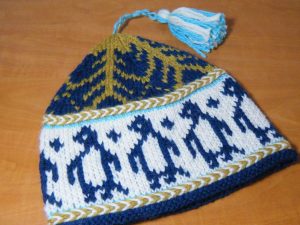
 Her creative hobby of choice is knitting and it’s a popular pastime on the ice. Knitters meet every Tuesday night for ‘Stitch and Bitch’ where experienced knitters teach new people the basics. She and a friend started a business aptly named ‘Antarctica Knitters’ complete with website and a book will be released soon.
Her creative hobby of choice is knitting and it’s a popular pastime on the ice. Knitters meet every Tuesday night for ‘Stitch and Bitch’ where experienced knitters teach new people the basics. She and a friend started a business aptly named ‘Antarctica Knitters’ complete with website and a book will be released soon.
“From a very early age, I guess you could say I had a creative streak. My Mom encouraged me as much as she could. She wouldn’t buy me candy, but she would buy me crayons.
“I learnt to knit from my dear Gramma Frances. She was very creative and crafty too. Her father knitted socks in the trenches in WWI. His wooden needles are one of my treasured possessions. I guess you can say I came from a long line of creative folks.
“What is it about knitting I love? Probably the same thing as lots of other knitters. For me mostly, it’s about colour. I have a passion for colour and like to experiment with different combinations. I also love pattern and texture and creating something beautiful and useful. It’s also portable, which is handy when travelling.”
They both enjoy their time in Antarctica which is often referred to as the coldest, windiest, driest place on the planet.
“The wind is harder to get used to than the cold. You can dress for the cold easily enough but when you add the wind, any slightest gap in your clothing becomes painfully apparent very fast. I failed to tuck my glove in properly one time and in the time it took me to walk between buildings I had a frozen patch of skin on my wrist that came up in a row of blisters,” says Anthony.
“The dryness was quite unexpected. Because the air temperature is almost always below freezing there is no moisture in the air. This means most people need to use a moisturiser of some kind. The other side effect of being so dry is lots of static electricity. People are constantly getting shocked reaching for door handles or light switches or even shocking each other. It also means bad news for electronics that are constantly getting zapped by the static when people open their computers or pick up a phone. The static discharge will ruin computer chips.”
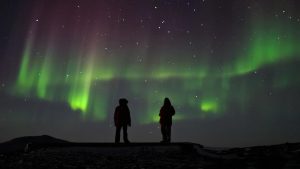
As the year comes to a close and they head ‘back in the real world’ Anthony sums things up.
“Living in Antarctica has changed the way I look at life, as when you are there you do not have many possessions. You just have the few bags you take down with you. It is a bit like living in a monastery in some ways. It makes you appreciate the little things and reinforces how the important things in life are other people around you rather than the things you have. Having less can be so much more fulfilling.
“The area where we work is far enough south that the temperature does not get above freezing very often so we do not see any big obvious changes in the environment. You see a lot of little things that get you thinking. No particular one of them you can definitely say is because of climate change but they do add up.
“However, other areas of Antarctica are showing huge changes. When we talk to the scientists doing the research, they are telling the same story from lots of different viewpoints and different types of studies. Climate change is definitely a big problem. If anything most scientists are quite conservative in their media statements s they have to maintain a high level of professionalism and be able to back up their claims.
“The way I see it, the planet does not need saving. It will carry on just fine with or without us. We just have to save ourselves from our own stupidity!”
*All photos copyright Anthony Powell

53 thoughts on “Anthony Powell – Living in Antarctica”